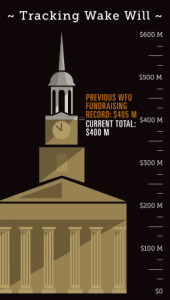Provost Kersh on Wake Will: $400 million milestone interwoven with faculty, staff accomplishments
The recent announcement that Wake Will: The Campaign for Wake Forest has surpassed the $400 million mark is a vital milestone along our path towards raising the $600 million that will support our University in many essential ways.
These funds are predominantly directed to strengthening and renewing our ability to carry out our core academic mission. If you haven’t already, I encourage you to read about the impact of the campaign on the Wake Will website. The most recent stories focus on our URECA Center for faculty-mentored undergraduate research, the cross-University approach to wellbeing, and a piece featuring eight generations of faculty members over two centuries, from Samuel Wait to Mary Dalton, who successively taught one another.
Since the launch of the Wake Will campaign last fall, we have regularly showcased ways in which the campaign relates to the vital work that faculty and staff do every day. Below I address some frequently asked questions about Wake Will from our faculty, staff, students, and alumni, further exploring how the funds raised support WFU’s commitment to academic excellence and our teacher-scholar ideal.
Q: How is the campaign benefiting students?
A: The Wake Will campaign has raised more than $121 million in scholarships and financial aid, with a particular focus on creating opportunities for first-generation and middle class students. We can see direct results in the declining figures for our new graduates’ average debt loads, following many years of steadily increasing debt. Students also benefit directly from donors’ commitment to facilities, from Davis Chapel and Kirby Hall to the ZSR Library, and to academic programs across our Reynolda Campus. More details about the campaign’s support for students is on the Wake Forest homepage.
Q: How does Wake Will support faculty?
A: Gifts totaling more than $120 million support everything from individual academic departments to University-wide campus life initiatives. One of the campaign’s highest priorities is retaining and recruiting our world-class faculty — including new endowed professorships, faculty fellowships, and five Presidential Chairs announced to date, with two holders (Michele Gillespie and Melissa Harris-Perry) already named. Funds raised will support faculty positions, endow our College academic departments and graduate/professional schools, and support expanded faculty-development programs.
Q: How will the Wake Will campaign support initiatives within academic departments and schools?
A: Wake Forest is committed to strengthening and supporting the academic experience. Departmental and School funds will enhance research and creative work, modernize classroom and lab facilities, and provide resources for learning and engagement. A central reason that many students choose Wake Forest is the close connections they form with faculty, as many of them affirmed during Teacher Appreciation Week (#WFUTaughtMe), at Commencement and in Wake Forest Magazine. The campaign is rolling out creative ways to excite alumni and other donors about supporting the faculty who contributed so much to their daily lives and careers, and who help transform society in positive ways.
Q: A lot of publicity has been given to new construction such as Farrell Hall and the McCreary Indoor Center. Where does the renovation of our older academic buildings and residence halls stand?
A: Over the next five years, the Wake Will campaign will turn several of our ambitions into reality, and identifying projects of donor interest is a key component. In addition to Reynolds Gym (on which see next question below), Wake Forest is aggressively pursuing donor support for major renovations of Scales Fine Arts Center, our science buildings, and Tribble and Carswell Halls. Finding donors to specifically fund residence hall improvements can be especially challenging.
Renovations to Worrell Professional Center, including a new home for the Department of Health & Exercise Science; ZSR Library; and Davis Chapel are underway this summer. Updating and renovating these and other facilities on campus depends vitally on support given through the campaign, much as philanthropy made Farrell Hall and the McCreary Indoor Center possible.
Q: What is the latest with the Reynolds Gym renovation?
A: President Hatch has spoken about the need to make wellbeing a pivotal component of the Wake Forest experience for students, faculty and staff. A significant part of this commitment will be realized through a major overhaul of Reynolds Gym. Our renovated and expanded plans for Reynolds Gym — with more details to come at the start of the year — will serve as a dynamic hub and catalyst for enhanced wellbeing across our campus community. The Reynolds facility will house programming, resources and facilities representing multiple dimensions of wellbeing, including but not limited to the physical.
With the introduction of Thrive, Wake Forest’s approach to comprehensive wellbeing, Student Health, Campus Recreation, and related University departments will call this building home, as will programs and classes focused on subjects such as nutrition, financial awareness, exercise, time management and coping skills, personal values and mental health. Transforming Reynolds Gym remains one of the top capital projects of Wake Will, and Wake Forest continues to pursue donor support to bring to life this vital physical center and shared space. You can expect to hear more about these plans in coming months.
Categories: University Announcements

